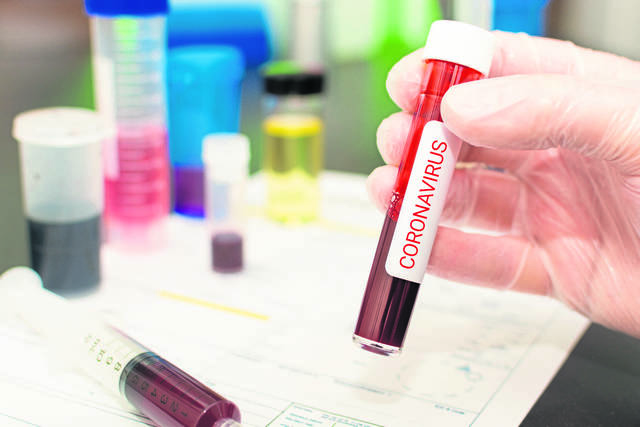1. How is the coronavirus different from the flu?
Flu and the coronavirus are both respiratory viruses with similar signs and symptoms, according to Dr. Amesh Adalja, a Pittsburgh-based infectious disease and critical care physician. Coronavirus symptoms include fever, cough and shortness of breath. A stuffy nose is not common in patients with coronavirus, according to the World Health Organization, which found that only about 5% of patients in China had nasal congestion.
Most people have mild or moderate symptoms and recover, experts say. However, the elderly and people with underlying medical conditions are particularly susceptible to covid-19, the illness caused by this coronavirus, according to experts at Pittsburgh-based UPMC.
Officials from the Centers for Disease Control and Prevention have said the virus spreads easily and people with diabetes, heart disease, lung disease and other serious conditions are more likely to develop serious outcomes.
Symptoms may appear in as few as two days or as long as 14 days after exposure.
While the flu strikes children harder than healthy adults, coronavirus symptoms appear to be milder in children, according to Dr. John Williams, chief of the division of pediatric infectious disease at UPMC Children’s Hospital of Pittsburgh.
According to the World Health Organization, people with mild illness recover in about two weeks, while those with more severe illness may take three to six weeks to recover.
2. If I feel sick, what should I do?
If your symptoms are severe (think shortness of breath or unremitting fever), it’s time to call your primary-care doctor. Severe symptoms could be signs of pneumonia, which has been linked to covid-19.
The CDC encourages people with mild symptoms to stay home and avoid going to work, school or public areas. If you are sick and are around other people, you should wear a face mask, according to the CDC.
Your doctor will determine if you need to be tested for the coronavirus, which has sickened about 750 people in the United States and at least 14 in Pennsylvania. Doctors in Western Pennsylvania are working with state health officials to administer tests.
People can’t just request to be tested for coronavirus at urgent care centers or doctors’ offices, according to Alex Azar, Secretary of Health and Human Services. He emphasized the decision to administer a test will be up to a physician. More than 4 million tests will be distributed nationwide by the end of the week, Azar said.
Factors that determine the need for testing include if you’ve been in close contact with a person with covid-19 or if you have recently traveled to an area with ongoing outbreak. Countries with ongoing outbreaks include China, Iran, South Korea and Italy.
Whether you are sick or not, you should wash your hands often with soap and water for at least 20 seconds. Other recommendations include: Avoid touching your eyes, nose and mouth with unwashed hands, and clean and disinfect high-touch surfaces such as counters, tabletops, doorknobs and phones.
3. Should I stop going to large gatherings such as sports events and theater performances?
If you are elderly or have other medical conditions, you should reconsider going to large gatherings to minimize risk of exposure, says Adalja, a senior scholar at the Johns Hopkins Center for Health Security.
Several high-profile public events have been canceled in Western Pennsylvania, including planned events by the Pennsylvania Special Olympics. National events canceled include the South by Southwest festival in Austin, Texas. Pittsburgh’s St. Patrick’s Day Parade, scheduled for the weekend, was canceled on Wednesday.
Local hospitals such as UPMC, which operates dozens of facilities in Western Pennsylvania, have asked people with flu-like symptoms to refrain from visiting hospitals and nursing homes. Allegheny Health Network has announced restrictions that affect visitors to its ten facilities in the region.
4. Should I cancel domestic travel plans?
If you are elderly or have other medical conditions, you should consider cancelling non-essential travel or finding alternative means to attend virtually, Adalja says.
The U.S. Department of State has urged people to check its travel advisories before making plans. The federal government has particularly singled out travel by cruise ships as high-risk, especially for people with underlying health conditions.
The CDC has asked airlines to report travelers with a fever and one of the following symptoms: persistent cough, difficultly in breathing and appearing obviously unwell. As a result of coronavirus fears, airlines have reported a sharp drop in bookings.
5. How long will this last?
In the Northern Hemisphere, covid-19 will likely spread to late spring and possibly taper off, to some degree, during the summer, Adalja says. It will likely reappear in the following respiratory virus season in the fall, he says.
The World Health Organization on Wednesday declared the coronavirus a pandemic. It has now spread to more than 100 countries.
Sources: U.S. Centers for Disease Control and Prevention, Pennsylvania Department of Health, Dr. Amesh Adalja








